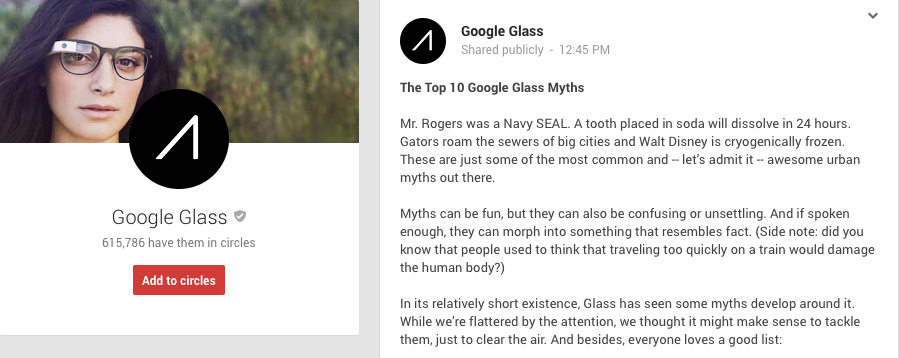In case you were wondering if Google Glass is ready for prime time, here’s the final word on that, straight from the horse’s mouth: It’s not.
The Glass team took to Google Plus (where else?) to defend its smart facewear gadget against a whole host of accusations … er, “myths” … that have been circulating about the device. Nestled in among them was Myth 4, an item that speaks to its relative lack of polish and bugs.

Myth 4—Glass is ready for prime time
Glass is a prototype, and our Explorers and the broader public are playing a critical role in how it’s developed. In the last 11 months, we’ve had nine software updates and three hardware updates based, in part, on feedback from people like you. Ultimately, we hope even more feedback gets baked into a polished consumer product ahead of being released. And, in the future, today’s prototype may look as funny to us as that mobile phone from the mid 80s.
The company’s position should come as no surprise. Google has always been clear that the current model of Glass is an early version—it even dubbed it Project Glass and made it only available as a developer release. The only thing missing was a neon sign slapped on it blinking “prototype!”
But rounding up this laundry list of issues and adding point-by-point responses is an odd tack to take, especially from a big tech player with a penchant for unleashing beta products and services. It even posted an etiquette guide last month, in the hopes of minimizing any “glasshole” behavior of its users. All that suggests the company’s getting a little tired of the barbs pitched at its pet project.
The litany of “myths” covers some common critiques, from Glass’ $1,500 priceyness and presumably well-heeled target audience to distraction and privacy. Especially privacy. Out of the 10 myths rebutted by Google, no fewer than five touch on privacy and surveillance concerns:
Myth 2: Glass is always on and recording everything
Myth 5: Glass does facial recognition (and other dodgy things)
Myth 7: Glass is the perfect surveillance device
Myth 9: Glass is banned… EVERYWHERE
Myth 10: Glass marks the end of privacy
Hey, Google—defensive much?
The Google+ post likens Glass to smartphones, the reigning and ubiquitous mobile devices with integrated cameras. What it fails to address is that phones aren’t always poised and ready to shoot photos or video, or that someone holding their phone up in your general direction is usually a pretty good tip off he or she is about to immortalize your likeness. If someone is wearing Glass, it’s pointing wherever they’re looking—and the device still has no LED to alert others when it’s recording. (Its screen may light up, but that’s not remotely the same thing.)
Here’s hoping the Glass crew can put as much effort into actually resolving these issues as it did defending itself against them.
Image by Flickr user tedeytan

















